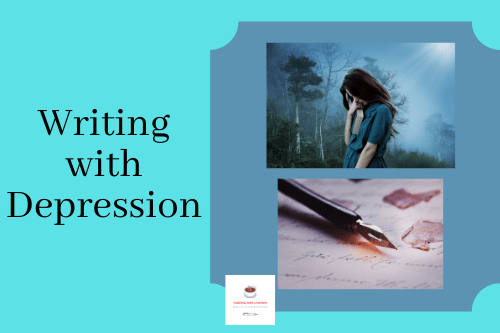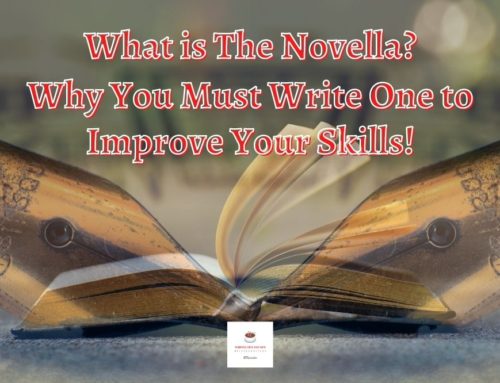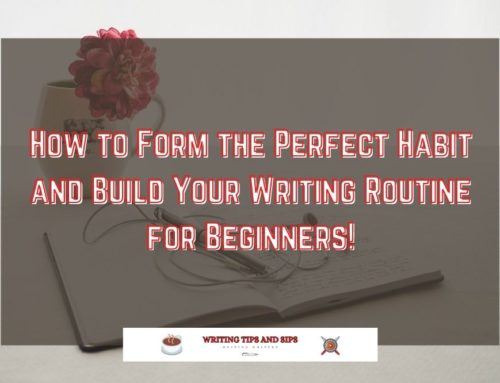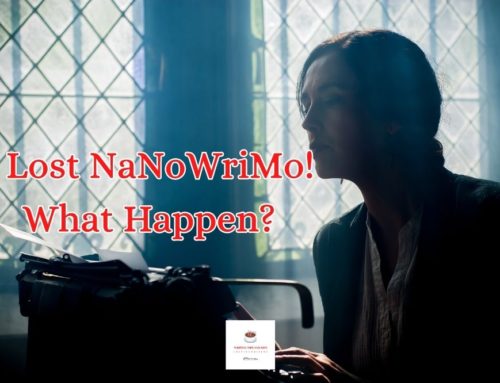Writing with Depression is hard! Depression is something I have been struggling with as long as I can remember. It is continually grabbing hold of me, getting in the way of the most mundane tasks.
How can I write with this shadow looming over me, yelling, “I am not good enough!” “I am not a real writer.” “I cannot succeed in my dreams.”
Day after day, I fight off these voices and push forward, moving toward the goals I know I am capable of doing. Still, an overwhelming emotional burn sears my chest as I struggle to get through even the most mundane of tasks.
When in a depressive episode, writing even a single sentence on a blank page takes all day. It feels like winning the Nobel prize – impossible, and only a select few can achieve it.
Focus is unfathomable – unachievable, and no matter how motivated you once were on your Work-In-Progress, it no longer matters. The project is dead, at least until you can pull yourself out of an episode.
But what is depression?
According to Psychiatry.org, “depression (major depressive disorder) is a common and serious medical illness that negatively affects how you feel, the way you think, and how you act.” You can read more here. It can last for weeks to months at a time, and it can take the most motivated and leave them unable to get out of bed.
Writing with depression is a challenge on its own. If you suffer from depression, I share the methods I use to keep writing in the hopes they can help you, and maybe get you out of your episode.
1. Meditate:

Depression twists and molds my thoughts into a negative space, of which I feel I am unworthy of the simplest of needs. Drinking water feels like a quest to steal from the mighty Smaug.
When stuck in a mode of negative thinking, the first step is to clear those thoughts. Make them lose their power.
I have talked a lot about meditation in this blog, and it probably deserves its own post. I bring it up again here because it is the number one most helpful tool for taking my mind back.
There are a plethora of different meditation techniques, and each one will be more or less effective based on your preferences.
I use a sitting meditation method. One where I focus on my breath while listening to music – usually binaural beats to help calm my mind. I generally set aside about five minutes for my meditation, and it’s the first thing I do before sitting to write.
Meditation allows me to witness my thoughts, see them as not myself, and let them go.
Every time a thought comes up, I acknowledge it, observe it for the feeling it is and can see that it is just the depression talking.
I am not my depression.Clearing my mind allows room for motivation to come back in. It gives me a space to store ideas and think about the syntax I am using, and piece together my story-thoughts onto the page.
2. Clearing Your Writing Space:
When depressed, your writing space needs to be a sanctuary. An area untouched by the negative energy – a place without judgment. When depression affects your writing space, it can feel tainted – making it impossible to get any work done.
First: make sure you have a space dedicated to writing.
Every time you enter this location, your mind knows it is time to write.Your writing area can be an office, a desk, a spot in your room, outside in the backyard, anywhere you feel comfortable. Mine is either the dining room table or a table in my room with a zafu pillow.
Second: Depression is an energy that can spread across your whole living area.
When I am depressed, I can see it affect those around me, and the same is true for my writing space.
I like to clear the energy before I start my writing session. There are many ways to do this; some prefer burning sage; some prefer prayers. I like to set up a crystal grid with amethyst and clear quartz. Amethyst helps awaken the creativity in my mind, while the quartz absorbs the negative energy.

Finally: I light incense and play chill-step music in the background. My go-to artist for this is Man of No Ego. Their calming electronic music soothes me into a creative trance perfect for focusing on my WIP. I recommend using whatever music helps you write.
After doing your little ritual, it’s time to stare your depression in the face and say, “You have no hold over me, foul beast.”
3. Setting goals:
You have meditated, your writing space is clear, and now it is time to sit down and write.
But, what is a reasonable expectation to have for yourself?Meditating and magic don’t fully get rid of depression; still, I am sad.
Enter the third step of my writing with depression guide: setting goals.
Now, these goals are going to be different for everyone and tailored to:
1.) how you feel.
And
2.) what you think you can reasonably accomplish.
When I am feeling entirely defeated by my depression, I am not going to expect myself to write 2500 words in two hours. It’s not going to happen, and I’m setting myself up for failure.
This week, I have been fighting through a depressive episode. Most days, I didn’t want to move from my bed, let alone write and work on my blog, or my stories.
However, after finishing steps one and two, I was able to motivate myself into my writing space. One day, I wrote 200 words; another day, I wrote a sub-header.
The point: both are progress, and sometimes, just getting something done, even the smallest of things, is an accomplishment. Pat yourself on the back, you did something even with your mind saying, “you can’t.”
Your writing goals should be based on your mood, and sometimes it is perfectly acceptable not to write. Your mind is a muscle, and it needs rest. Sometimes it is better to take a break and focus on your healing.
Save writing for another day.
4. Use Your Coping Skills:
All feels lost when depression takes over. Writing doesn’t feel good enough. You question if you are even a writer. Maybe, you begin to question the point of existence.
I lose interest in the things that usually please me and take an unwanted trip into my darkest thoughts.
This is where coping skills come in handy.
The first coping skill I turn to when depression takes over is trying to sink into a videogame, book, or movie. It is the skill of distraction. By leaving my head, it gives me space to not focus on the negativity. The distraction allows me to detach from the depression and feel closer to normal for a moment.
The next coping skill I’ll use is mindfulness. I try to pay attention to every movement I make, every thought I have, and every breath I take. Doing this keeps the depression at bay.
Similar to meditation, I can see when I have a depressive thought and detach it from myself. I realize that the feeling is just a figment of my mind based on the attachment to said thought.
Everyone has their coping skills, and I implore you to use them. Please, do whatever it takes to pull yourself out of a depressive episode. You are important, and it is difficult to remember that at that moment.
Take care of yourself, you have yet to achieve your potential, and the world is ready for what you have to offer!5. Reach out!

The final and most crucial step I share with you today is to reach out to friends and or family. In the grips of depression, it feels like nobody cares. The beast wants you to feel alone, that is how it takes you, but you are not alone.
When depression holds me tightest, I talk to my fiancée; I share my feelings with her, and she validates me, I feel heard. Together we walk through the labyrinth of emotions; she guides me to the exit.
If you don’t have a partner or they aren’t supportive or understanding, try turning to a friend or family member. Talk about your feelings with your pet; let it out. There are also online communities with people waiting to help.
Remember, you are not alone. Depression wins by isolating you, beat it by surrounding yourself with others. Your voice matters, you matter.
I recommend therapy. Having a counselor helps work through your past traumas and gives you more coping skills to utilize when another episode presents itself. I am currently using better help and am talking to a counselor once a week. Talking helps!
Conclusion:
Depression is a monster of a disorder. According to dbpsalliance.org, “Major depressive disorder affects approximately 17.3 million American adults, or about 7.1% of the U.S. population age 18 and older, in a given year.” Depression makes it hard to function in your regular daily routines, and it feels impossible to stay motivated during an episode.
Remember, you are not alone, and there are always people in your corner. Stick to your coping skills – set goals for yourself. If you can bring yourself to get writing done, that is great. But if not, that is perfect too. I hope my tips can help, and please leave a comment sharing your own tips in getting out of a depressive episode!
C. D. Baron
Latest posts by C. D. Baron (see all)
- What is The Novella? Why You Must Write One to Improve Your Skills! - 03/21/2021
- Wake Up! A Short Story (Work in Progress) - 02/07/2021
- My Top 5 Favorite Reads of All Time (So Far) - 01/24/2021







Incredible information! It seems that coping skills will look differently to everyone. I suggest for everyone to develop a list of their own such as journaling, going on walks, listening to music etc. That way everyone can see what works best for them! 🙂